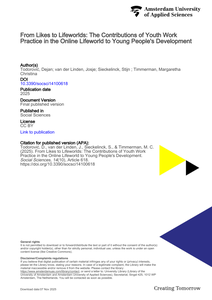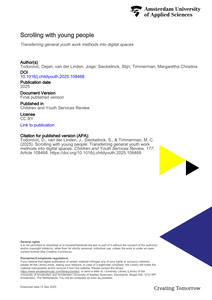As youth workers increasingly offer support and guidance within digital environments, the question arises as to what impact this support has on the (online) lives of young people. This paper explores the contribution of youth work practice in the online lifeworld on young peoples’ development, building on previous studies concerning youth work outcomes and the developmental needs of young people. A qualitative research design was employed, including digital diaries of youth workers and semi-structured interviews with both young people (N = 37) and youth workers (N = 25). The findings highlight the role of youth work in helping young people navigate social media; develop new skills, talents, and social connections; and increase awareness of online risks. Youth workers also support young people in coping with negative online experiences, including loneliness and mental health challenges. The contribution of online youth work is less visible in certain aspects of developmental needs, namely online safety and privacy, self-image, and assessing online information. This paper concludes by emphasising the need for further research into the long-term impact of youth work in the online lifeworld, particularly in light of rapid technological developments, the growing influence of artificial intelligence, and the increasing involvement of youth in digital forms of crime. The findings described in this study can form a base for future research to better understand the impact of these emerging issues on youth development and youth work practice, as well as to develop appropriate interventions.
DOCUMENT

The online environment, where the boundaries between the domains of home, school, work, and leisure are blurred, poses new challenges for youth work practice. Due to limited research on this subject matter, the theoretical underpinnings of the online youth work practice are constrained. The fulfilment of youth work’s aims online, the position it can take in the online context, and its relation to its partners in the online lifeworld need a theoretical base. This paper seeks to analyse the role of youth work in the online lifeworld according to adolescents and youth work’s partners. The research was conducted in the Netherlands in collaboration with 14 youth work organisations. A qualitative research design was used: group conversations with young people and semi-structured interviews with youth work’s partners (i.e., parents, schools, informal networks, neighbourhood support teams, police, and municipal officials). The findings indicate that youth work in the online lifeworld, according to the respondents, is part of the general youth work practice, with a primary role of addressing the developmental needs of young people and creating new developmental opportunities. This role is expected to be fulfilled by engaging and connecting with young people in the online lifeworld and providing them instrumental, informational, socioemotional, and cognitive support. To do so, according to the partners, youth workers can make use of their vantage position in the online relationship with adolescents in order to access online information relevant for support and prudent prevention aimed at adolescents’ development. This vantage position may potentially encourage a collaboration between young people and partners, and between the online and offline youth work practice.
DOCUMENT

With the increasing significance of the online lifeworld in the lives of adolescents, youth work must adapt its methods to support young people’s personal development and social participation in this hybrid online space. To date, there is limited knowledge on how youth workers can effectively employ methodical actions in the online environment. This paper draws on established offline youth work methods to explore their potential transferability to the online context. The research question guiding this study is: How can offline youth work methods be used in the online lifeworld to support adolescents’ developmental needs? Using the Change Laboratory method, 26 youth workers from 14 youth work organisations in the Netherlands participated in this research. The findings suggest that while offline methods provide a valuable resource, they cannot be directly transferred to the online context without adaptation. Instead, they offer a framework for seven specific methodical actions that can be adapted or developed for the online context. They are: 1) Increasing online visibility and accessibility, 2) Orienting, 3) Signalling, 4) Making contact, 5) Building meaningful relationships, 6) Assessing needs, and 7) Providing support. By identifying these seven methodical actions which are crucial for addressing the developmental needs of adolescents online, this paper contributes to the growing body of knowledge on youth work in the online lifeworld.
DOCUMENT

Meidenwerkers menen van grote waarde te zijn voor het realiseren van de transformatiedoelen die voortvloeien uit de grootschalige stelselvoorziening in het sociale domein. Voor het werkelijk realiseren van hun ambitie hebben meidenwerkers hulp nodig. Meidenwerkers willen aan gemeenten, managers en collega-professionals kunnen laten zien wat concrete resultaten zijn van het meidenwerk voor het versterken van de eigen kracht. Daarvoor willen meidenwerkers meer weten over de werking van het meidenwerk. Ook willen meidenwerkers op specifieke onderdelen hun methodiek verbeteren. Meidenwerkers en hun organisaties door heel Nederland hebben lectoraat Youth Spot gevraagd om middels deze RAAK- Publiek aanvraag vast te stellen of en hoe het meidenwerk bijdraagt aan het versterken van de eigen kracht van meiden en op welke manier het meidenwerk beter ingezet kan worden op het gebruik van de groep, de familie en het netwerk. Consortium: In het consortium participeren de organisaties die investeren en meewerken aan de uitvoering van het project. Deze bestaat naast de Hogeschool van Amsterdam uit 9 publieke organisaties: ContourdeTwern, JoU, Dock, IJsterk, Streetcornerwork, Participe, Combiwel, Stichting Jeugd en Jongerenwerk Midden Holland en Dynamo. Deze organisaties zijn aanbieders van meidenwerk in grootstedelijke, stedelijke en landelijke omgevingen uit het midden, westen en zuiden van het land. Ambitie: De ambitie van meidenwerkers en hun organisaties is om met dit project aan te tonen wat de werking en het resultaat is van het meidenwerk voor het versterken van de eigen kracht van meisjes en jonge vrouwen en de methodiek meidenwerk zodanig te verbeteren dat die aansluit op hedendaagse ontwikkelingen in jeugd- en sociaal beleid. Dit opdat gemeenten blijven investeren in het meidenwerk en meisjes en jonge vrouwen in kwetsbare posities toegang houden tot ondersteuning bij het ontwikkelen van hun eigen kracht. Resultaat: Handboek: ?Kracht van meiden 2.0? waarin de met empirie onderbouwde methodiek meidenwerk beschreven staat. Nieuw ontwikkelde instrumenten worden opgenomen in de herziene methodiekbeschrijving. Ook wordt er een online platform ontworpen, waar professionals en studenten door middel van blended en sociaal leren de gelegenheid krijgen om zich de ontwikkelde kennis en instrumenten werkelijk eigen te maken. Projectplan: Het projectplan bestaat uit drie fases waarin vijf werkpakketten centraal staan. Fase 1 beslaat het onderbouwen van de methodiek (WP1), fase 2 het doorontwikkelen van de methodiek (WP 2,3 & 4) en de 3e fase kenmerkt zich door kenniscirculatie en disseminatie (WP5).